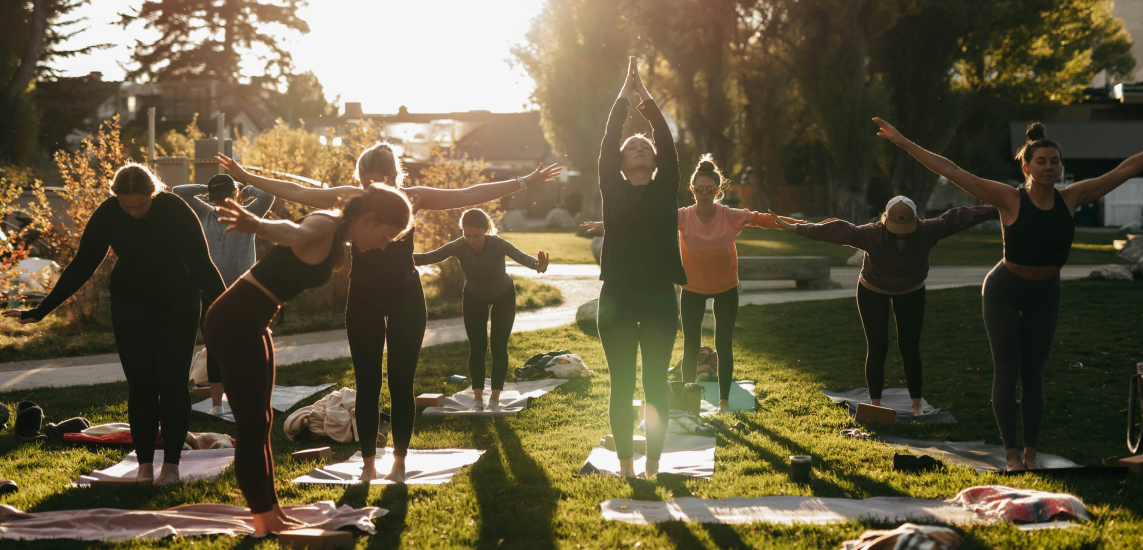This article was created using insights from Insight Timer’s retreat hosts and experts.
Between full inboxes and full calendars, it’s easy to lose touch with ourselves—making space to slow down, reflect, and reconnect with our authentic selves can feel out of reach. That’s where spiritual retreats come in. Unlike wellness retreats or fitness retreats, which often emphasize physical health, a spiritual retreat is about more than detoxing or meeting your fitness goals. It’s a chance to fully immerse yourself in spiritual growth, self-reflection, and inner peace, all within a safe and supportive environment.
In this guide, we’ll explore 13 types of spiritual retreats rooted in traditional practices—from Buddhist retreats to yoga retreats and plant medicine ceremonies. You’ll learn what each retreat type offers, get practical advice on choosing the right one for you, and find insights from real retreat leaders who hold these transformative experiences around the world.
Key takeaways
- Spiritual retreats provide a safe and supportive space to step away from daily distractions and reconnect with your authentic self through stillness, reflection, and sacred practice.
- There are many types of spiritual retreats, including Buddhist, Christian, Jewish, yoga, and Indigenous or shamanic retreats, each offering unique practices such as meditation, chanting, ritual, and sacred study.
- Choosing the right retreat type depends on your needs—whether you’re seeking solitude, community, structured guidance, or a deeper connection to a spiritual tradition.
- To prepare for a meaningful retreat experience, set clear intentions, honor the roots of the practices, and stay open to both transformation and discomfort.
- Insight Timer’s retreat marketplace connects you with trusted retreat leaders around the world, making it easy to explore different spiritual paths and integrate your journey with 200,000+ free meditations and online tools for spiritual growth.
What makes a retreat ‘spiritual’?
At their core, spiritual retreats are about reconnecting with a core part of yourself beneath the roles, routines, and responsibilities of daily life. They often take place in serene retreat centers and are grounded in lineage-based practices, sacred intention, and the guidance of experienced teachers. As Paulina Burzynska, an Insight Timer retreat host, puts it:
“A spiritual retreat invites you back to your core self. It becomes a journey of the soul, not a to-do list for self-improvement.”
Unlike detox retreats, weight loss retreats, or spa treatments, these experiences go beyond the body and mind—they help you connect to a higher truth, spiritual well-being, and your inner compass. May Bartlett, another Insight Timer retreat host, shares:
“A spiritual retreat goes beyond mind and body to connect with the spiritual realm—however the particular tradition defines it.”
Looking for a women’s retreat that helps you return to your center? Join Paulina Burzynska in Guaro, Spain, this September for the Soul Elements Retreat—a nurturing journey of embodiment, emotional release, and reconnection through movement, nature, and ceremony.
Buddhist retreats
Buddhist meditation retreats are deeply introspective journeys designed to quiet the mind, cultivate self-awareness, and develop compassion. Many retreats include dharma talks, silent sitting, and outdoor activities like mindful walking. The structure is simple yet intense, often involving:
- early morning wake-ups
- 10+ hours of seated and walking meditation
- daily dharma talks to guide the practice
- shared meals in silence
Vipassana retreats
A Vipassana retreat, rooted in Theravāda Buddhist tradition, is typically a 10-day silent retreat. Participants spend their days in complete silence, practicing deep mindfulness and moment-to-moment awareness—without reading, writing, or verbal communication.
This practice is designed to help you observe your inner world without judgment, developing equanimity and breaking patterns of reactivity.
May Bartlett shares:
“It can help you connect with a deeper part of yourself that isn’t caught up in the mental stories we tell ourselves.”
Paulina Burzynska, who has guided students through periods of extended silence, adds:
“People often return from silence with more clarity and patience. Suddenly you’re not reacting to everything around you, but responding from a calmer, more grounded place.”
Though demanding, a Vipassana retreat offers a powerful reset—one that reveals how much insight is available when we stop trying to fix or change and simply begin to observe.
Zen sesshins
Zen sesshins are intensive meditation retreats held within the Japanese Zen tradition. The word sesshin translates to “gathering the mind,” and that’s exactly what participants are invited to do—turn inward through long periods of zazen (seated meditation), walking meditation, and mindful movement. These retreats often take place in monastic or temple-like retreat centers and follow a structured daily rhythm that includes:
- early morning bells
- silent meals
- physical stillness
- strict posture during sits
- evening chants
- dharma talks or koan inquiry
Unlike more spacious or flexible retreat types, Zen sesshins are known for their discipline. The intensity of the schedule is intentional—it creates the container for mental clarity, self-awareness, and direct experience of the present moment. While challenging, many practitioners find that sesshin helps strip away distraction and ego, revealing a deeper sense of peace and simplicity.
Tibetan Buddhist retreats
Tibetan Buddhist retreats are deeply rooted in the Vajrayāna tradition and often include a combination of meditation, visualization, and mantra recitation. These retreats can vary widely in length and focus, ranging from introductory weekend programs to multi-year solitary retreats guided by lineage holders. And their goal is to awaken wisdom, compassion, and a direct experience of the nature of mind.
A key element of these retreats is deity practice, where practitioners visualize enlightened beings like Tara or Chenrezig and recite associated mantras. Other common elements include:
- silent or semi-silent periods for meditative focus
- group rituals like pujas or fire ceremonies
- integration of Tibetan sacred texts and prayer recitation
While these retreats may be more esoteric than other types of retreats, they offer profound tools for self-transformation. For those drawn to mysticism, structure, and deep devotional practice, a Tibetan Buddhist retreat is worth exploring.
Hindu retreats
Often based in ashrams or spiritual centers, Hindu retreats integrate yoga, devotional chanting, and philosophical study into daily life. They typically draw from ancient texts such as the Bhagavad Gita and offer both ritual and contemplative practices as a path to self-realization.
Bhakti retreats
Bhakti yoga is known as the path of devotion—an open-hearted spiritual tradition centered on love for the Divine. Bhakti retreats offer a deeply immersive experience where participants are invited to connect with the sacred through music, prayer, and community. Rather than focusing on technique or intellectual study, these retreats emphasize emotional connection, surrender, and presence.
A typical Bhakti retreat includes:
- kirtan (call-and-response chanting)
- puja (ritual offerings or ceremonies)
- teachings from sacred texts like the Bhagavad Gita or Ramayana
- satsang (gathering in spiritual community for truth-sharing)
For those who feel nourished by connection, expression, and the sacred through sound, ritual, and community, a Bhakti retreat offers a beautiful way to soften the mind and awaken the heart.
Jnana retreats
Jnana yoga is the path of wisdom and self-inquiry, often described as the most introspective of the four traditional yogic paths. Jnana retreats focus on exploring the nature of the self through contemplative practices and philosophical study, rooted in sacred texts like the Upanishads and Bhagavad Gita. The central question in this tradition is simple, but profound: Who am I?
Participants are invited to reflect on this question deeply and repeatedly through practices like svadhyaya (scriptural study and reflection), guided inquiry or meditation, silence, and self-reflection.
Unlike more active or expressive retreat types, Jnana retreats are quiet and spacious, encouraging participants to turn inward and observe thought patterns, identity, and the stories of the ego. For seekers drawn to clarity, stillness, and the pursuit of ultimate truth, Jnana yoga retreats offer a powerful path of transformation through direct insight and inner inquiry.
Yoga retreats
Yoga retreats are among the most popular types of spiritual retreats, offering a balance of physical practice, inner stillness, and spiritual philosophy. Rooted in the Hindu tradition, these retreats go beyond the physical aspects of yoga and invite participants into a holistic experience of mind-body-spirit integration.
A typical spiritual yoga retreat includes:
- asanas (physical postures that ground the body and nervous system)
- pranayama (breathwork practices to calm and regulate energy)
- meditation and yoga nidra for deep relaxation and self reflection
- teachings from texts like the Bhagavad Gita or Yoga Sutras of Patanjali
These retreats may also include chanting, rituals, digital detox, or time in nature, depending on the teacher and tradition. While some retreats focus on physical alignment and technique, others are centered on inner inquiry, devotion, or even transformative experiences related to energy and consciousness.
For those looking to reconnect with their spiritual well-being while also supporting physical health, yoga retreats offer a deeply nourishing and accessible way to return to balance, on and off the mat.
Craving a retreat that awakens your intuition and inner magic? Join Paulina Burzynska in Utah this June for Spellbound: Embodying the Magical Way—a soulful gathering that blends ritual, movement, and myth to help you reconnect with your wild, intuitive self.
Christian retreats
Christian retreats create space for prayer, silence, and spiritual reflection, often within monasteries, churches, or dedicated retreat centers. These retreats draw on contemplative traditions that encourage simplicity, stillness, and a deepening relationship with God through practices like bible study, spiritual direction, and sacred ritual.
Ignatian retreats
Ignatian retreats are rooted in the Spiritual Exercises of St. Ignatius of Loyola, a structured path of reflection designed to deepen one’s relationship with God. These retreats are often held in retreat centers or run by Jesuit communities, and they invite participants into a prayerful process of discernment, self-reflection, and spiritual clarity.
A classic Ignatian retreat typically features:
- daily periods of guided prayer and scripture contemplation
- personal time for journaling and silent reflection
- one-on-one spiritual direction with a trained guide
Many Ignatian retreats are silent, creating space for participants to listen inward and engage more fully with the movements of the heart. The goal isn’t to withdraw from life but to return to it with greater purpose, compassion, and alignment—a great option for those wanting practical spiritual tools, gentle faith, and a way to integrate faith into their everyday life.
Monastic-style retreats
Monastic-style retreats offer a chance to step into the quiet rhythm of monastic life, where prayer, stillness, and structure guide each day. Often held in abbeys, convents, or retreat centers affiliated with Christian orders, these retreats invite participants to live alongside monks or nuns and experience the simplicity and sacredness of daily life.
Participants normally attend fixed prayer services, spend time in silent contemplation, share meals in silence, and engage in acts of service. These retreats are usually semi-silent or fully silent, with long stretches of personal reflection woven into a communal routine.
For those longing for stillness, spiritual discipline, and time away from the noise of daily life, a monastic retreat offers a profound return to simplicity, purpose, and the present moment.
Contemplative prayer retreats
Contemplative prayer retreats invite participants into deep silence, stillness, and inner listening. Rooted in Christian mysticism, these retreats often center on practices like Centering Prayer, Lectio Divina, and silent meditation—designed to help you move beyond words and concepts into a direct experience of the Divine.
If you attend a contemplative prayer retreat, you can expect extended periods of silence, scripture-based meditation, and daily prayer. Rather than focusing on theology or structured teaching, like some Christian retreats do, these retreats emphasize presence, offering a spacious container to rest, pray, and reconnect with God.
Indigenous and shamanic retreats
Indigenous and shamanic retreats are grounded in earth-based wisdom traditions that emphasize connection to the land, the ancestors, and the unseen world. Often held in nature-rich settings, these transformational retreats invite participants into practices like ritual, ceremony, and sacred song, offering pathways to healing, guidance, and deeper alignment with the natural world.
Vision quests
A vision quest is a traditional rite of passage found in many Indigenous cultures, often used to mark transitions, seek guidance, or receive spiritual insight. These experiences are typically carried out in remote natural settings, where participants spend several days alone, fasting, praying, and listening deeply to the land and spirit.
Guided by trained facilitators or elders, a modern-day vision quest may be adapted for personal growth and spiritual reflection, but always with a strong emphasis on respect and preparation.
Vision quest participants can expect:
- a solo period in nature (often one to four days)
- minimal food and no distractions
- a reintegration period and community reflection afterward
For non-Indigenous participants, it’s essential to recognize that vision quests especially hold sacred significance in the cultures they originate from, and the meaning may be profoundly different for Native American communities practicing within their own traditions. Approaching this retreat type with humility, cultural sensitivity, and proper guidance ensures that it remains a respectful and transformational experience for all involved.
Plant medicine retreats
Plant medicine retreats are immersive spiritual experiences that use sacred plants, such as ayahuasca, peyote, or cacao, to support deep self-reflection, emotional healing, and expanded states of consciousness. These ceremonies are often led by trained facilitators or traditional healers and take place in nature-rich retreat centers that are designed to create a safe, grounded, and supportive environment.
A plant medicine retreat may include:
- ceremonial rituals held at night, often guided with song or prayer
- preparation practices, such as dietary restrictions and intention-setting
- integration sessions to process and apply insights from the experience
For many participants, these retreats offer transformative experiences, including emotional release, spiritual clarity, or a sense of reconnection with nature and the authentic self. However, it’s important to acknowledge that many of these plant retreats originate from Indigenous lineages where they are used in a sacred, ceremonial context.
As retreat host Paulina Burzynska shares:
“I guide cacao ceremonies with reverence for its Indigenous roots, having trained and studied how to honor this medicine respectfully.”
Approaching the experience with humility, reverence, and an openness to learn is essential.
Remember, these retreats are not recreational and must be experienced in controlled environments with experienced guides.
Jewish retreats
Blending ancient wisdom with present-day reflection, Jewish retreats offer a space for Shabbat rest, prayer, and the study of sacred texts. Whether contemplative or community-based, they reconnect participants with tradition through intentional time away from the demands of daily life.
Kabbalah and mystical study retreats
Kabbalah retreats offer a contemplative entry point into the mystical part of Judaism, where the focus shifts from laws and customs to inner transformation and divine connection. Rooted in sacred texts like the Zohar and the Sefer Yetzirah, these spiritual retreats invite participants to explore universal themes such as light and shadow, the Tree of Life, and the nature of the soul.
A Kabbalistic retreat may include:
- study of mystical texts and teachings
- meditation, chanting, or visualization practices
- group reflection on spiritual symbols and archetypes
- rituals designed to align the inner and outer world
Rather than being academic or purely intellectual, these retreats are immersive and experiential, blending sacred study with spiritual practice to support personal growth and self-inquiry.
Jewish Renewal retreats
Jewish Renewal retreats are inspired by the Jewish Renewal movement, a modern, transdenominational approach to Judaism that emphasizes mysticism, inclusivity, and spiritual vitality. The movement reimagines Jewish practice for contemporary seekers, and the retreats offer a fresh, heart-centered way to engage with Judaism.
Participants might experience the following practices during a Jewish Renewal retreat:
- musical Shabbat services
- meditation and contemplative prayer rooted in Jewish texts
- group study on themes like justice, compassion, and spiritual awakening
- opportunities for storytelling, dance, or spontaneous expression
These retreats tend to be community-oriented, often intergenerational, and intentionally accessible to those who may not feel at home in more traditional Jewish spaces. While deeply grounded in Jewish mysticism and text, the approach is open, experiential, and emotionally attuned.
How to choose the right spiritual retreat for you
Choosing a retreat is less about finding the “perfect” path and more about listening to what resonates with you right now. Are you craving stillness and solitude or community and expression? Do you feel drawn to a specific spiritual tradition, or are you simply curious and open to exploring?
Paulina Burzynska suggests beginning with your intuition:
“Start by listening to that first gut feeling, the quiet nudge that pulls you toward something or someone… The right path will never demand perfection—it will feel like a remembering, like something inside you is gently saying yes.”
It’s also helpful to consider:
- your comfort level with silence, ritual, or structured guidance
- whether you want a retreat rooted in a specific lineage or a more interspiritual experience
- what kind of supportive environment you’ll need to feel safe and present
As May Bartlett reminds us:
“You don’t have to stick with any particular tradition. But once you find one that does work for you, it can be helpful to spend time there and deepen into the practice… You’re going to get a lot closer to Source if you spend time digging in one hole as opposed to starting a bunch of different holes.”
Ultimately, the most important thing is to approach your retreat with openness, curiosity, and a willingness to be changed, however gently or profoundly that change may come.
Find top spiritual retreats on Insight Timer
Insight Timer is more than just a meditation app—it’s a thriving global community of yoga, meditation, and spiritual seekers. From silent meditation immersions and healing nature retreats to sacred plant medicine ceremonies and women’s circles, the platform brings together a wide range of experiences led by trusted, heart-centered facilitators.
With spiritual retreat listings from around the world, Insight Timer connects you to soulful getaways in breathtaking locations—whether you’re looking to explore nearby or venture across the globe.
FAQs about types of spiritual retreats
What are the different types of spiritual retreats?
There are many types of spiritual retreats, each offering a unique path to self-awareness, spiritual growth, and inner connection. Some are rooted in long-standing traditions, while others are blended with modern practices. Here are a few common types:
- Buddhist retreats: Often silent, focused on meditation, mindfulness, and dharma talks
- Yoga retreats: Blend asana, breathwork, meditation, and philosophy in serene retreat centers
- Christian retreats: Include Ignatian, monastic, or contemplative prayer formats rooted in scripture and reflection
- Jewish retreats: Centered on Shabbat, Kabbalah, or Jewish Renewal practices of ritual, study, and rest
- Indigenous and shamanic retreats: Use ceremony or plant medicine to foster connection with the earth and spirit realms
- Interfaith or non-denominational retreats: Open to all seekers, focusing on presence, compassion, and the authentic self
Do I need to follow a religion to go on a spiritual retreat?
Not at all. While many spiritual retreats are rooted in religious traditions—like Christianity, Judaism, or Hinduism—they are often welcoming to people of all backgrounds and belief systems. Some retreat centers offer explicitly interfaith or non-denominational experiences that focus on universal values like inner peace, mindfulness, and spiritual well-being.
Can beginners attend a spiritual retreat?
Yes! Many retreats are designed with beginners in mind. You don’t need prior experience with meditation, yoga, or spiritual practice to benefit from a retreat experience. Retreat leaders typically offer guidance, structure, and a supportive environment so that even newcomers can feel at ease.
How do I prepare for a spiritual retreat?
Start by reflecting on why you’re attending and what you hope to receive or release—this intention can help guide your experience. On a practical level, pack comfortable clothing, limit digital distractions, and consider journaling beforehand to connect with your goals. Some retreats (especially plant medicine or silent retreats) may have specific preparation requirements like dietary guidelines or pre-retreat readings.
Curious about experiencing your first meditation retreat? Check out our guide on what to expect at your first meditation retreat. Find practical tips, personal insights, and everything you need to feel more prepared and at ease before you begin.







